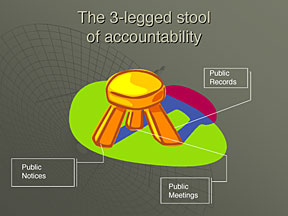News websites eclipsing government sites as alternative source of notice?
Public Notice Resource Center & NNA
Mar 1, 2024
Public notice legislation introduced so far in 2024 suggests state legislatures are growing increasingly comfortable allowing news websites to serve as an alternative source of official notice. That comfort seems to have cooled their ardor to move notices from newspapers to government websites.
As of the end of last week, new legislation authorizing local news websites or newspaper websites to provide statutory notice in lieu of print newspapers had been introduced in at least six states, while bills sanctioning the move from print to government websites had been introduced in only two states — and one of them is already dead.
That’s a dramatic shift from last year, when legislation allowing government websites to substitute for newspaper notice had been introduced in 12 states by early February. Legislation is non-binary and often difficult to categorize, so there are limits to the analytical usefulness of year-to-year analyses. But there’s no denying the numbers so far are striking.
The most serious efforts to authorize news websites to distribute public notice are underway in Virginia and Indiana.
VIRGINIA
Virginia HB-264/SB-157 allows online-only news publications to compete with official newspapers for the opportunity to run public notices if they meet a rigorous set of qualifications, including a dedicated domain name, a local news staff and regularly updated local news coverage. Their license to serve as official publications also must be approved and certified annually by a local circuit court.
The legislation is supported by the Virginia Press Association, which for the past several years had helped defeat bills authorizing local news websites to provide official notice. VPA concluded it needed to come to the table this session or lose control of the process, says VPA Executive Director Betsy Edwards. “We had run out of ways to say no,” she says, noting the bill’s Democratic sponsor promised to make its passage a priority this session. His threat was bolstered when his party took back control of the House in the state’s 2023 election and he was appointed chairman of the committee that would initially consider the bill.
“Our overriding goal was to allow local news sites to publish notices,” explains Edwards. “Newspapers will still publish ninety-five percent of them, but as long as the news sites meet the strict parameters in the bill, we’re OK with them competing for the rest.”
HB-264/SB-157 began as a proposal hammered out by a VPA committee that in addition to key members and staff included the publishers of the four local news websites that expect to qualify to publish notices if it is signed into law. The Senate version passed by the upper chamber by a vote of 36-3 last month, and after its House companion sailed through committee, it is expected to be approved by the lower chamber this week. It would make Virginia the first state to authorize local news websites to publish notices.
INDIANA
Indiana HB-1204 authorizes some newspaper websites and e-editions to provide notice in lieu of print newspapers. It passed the House unanimously last week and was immediately referred to the Senate. It allows government units to post notices in the e-editions of official newspapers published in print less than four times per week and in the e-editions or on the websites of papers published fewer than three times per week. The bill also incentivizes those in the latter cohort that don’t have a website to get one since it authorizes local governments in those jurisdictions to post notices on their own website if there isn’t a qualified newspaper website on which to publish them.
The Indiana Senate is considering a different measure easing eligibility requirements for official newspapers while increasing circulation minimums. SB-252 expands the potential universe of official newspapers by reducing the continuous publication mandate from three years to one, plus enlarging the jurisdiction within which a newspaper must be “published” from a specific city, town or township to the county in which the municipality is located. It also has the potential to simultaneously shrink the official-newspaper universe by increasing the state’s average paid-circulation requirement from 200 to 500 and expanding the paid circulation threshold of 2 percent of the county population to all newspapers in the state, not just those in counties with population less than 40,000. SB-252 unanimously passed its first committee hurdle last week.
It’s important to note that the tenor of public notice legislation in Indiana has changed significantly. Two years ago, it was one of the handful of states that appeared likely to be among the first to make the move to government websites. Now there’s a real chance it will be a pioneer in advancing newspaper websites as a potential successor to print.
TENNESSEE
In Tennessee, a local-news-website bill was introduced last week that has the virtue of maintaining existing newspaper notice. HB-2114/SB-2317 requires notices that must be published in newspapers to also be published “on a news and information website, if available.” To qualify, such websites must be headquartered in the county of jurisdiction and report “news of general interest to the community” that is updated at least once a week. The Tennessee Press Association hasn’t taken a position on the bill.
Meanwhile, TPA is gearing up to fight HB-2430, which reduces the state’s foreclosure-notice requirement from three newspaper publications to one while mandating that each notice must also be posted on the Secretary of State’s website at a cost of $100. It allows that government website notice to completely replace newspaper notice if no official newspaper is published in the county or there isn’t one willing to publish the ad at its regular classified advertising rate. HB-2430 is backed by the Tennessee Bankers Association, which has scaled back its immediate ambitions after failing to move legislation in previous years that would have completely eliminated foreclosure notices in newspapers.
SOUTH DAKOTA
The South Dakota Legislature is close to passing one bill allowing free-circulation newspapers to qualify to publish notices and another that automatically raises public notice rates each year to keep pace with inflation.
SB-75 requires free newspapers to maintain a minimum of 200 paid online subscribers and a print circulation of at least 500 copies to be considered official. They are also required to publish an annual independent audit verifying their print and online circulations. The South Dakota NewsMedia Association opposed a similar bill last year but agreed to support this year’s version after its sponsors agreed to add the audit requirement. After passing the Senate unanimously last month, SB-75 was also approved by a unanimous vote in the House on Friday. It now goes to the governor for her signature.
SB-152 replaces the annual review of public notice fees — which is supposed to be conducted by a state agency but rarely is — with a process that raises rates every year by the lesser of two percent or the annual rate of inflation computed by the Bureau of Labor Statistics. It is also backed by SDNA and was unanimously approved by a Senate committee last month.
New York paper sues county over pulled notices
A newspaper based in Delaware County, New York, sued county officials in December (https://bit.ly/49Izq5G), claiming they unlawfully canceled its public notice contract in retaliation for unfavorable news coverage. The Reporter, a weekly newspaper based in the county seat of Delhi, also alleges the county violated the First and Fourteenth Amendments by ordering its employees to refer all questions from the paper to the county attorney’s office.
The lawsuit was filed in federal court by Decker Advertising, the agency that owns The Reporter.
Various county officials had complained since 2019 about The Reporter’s coverage. The conflict burst into public view in March 2022 when the county’s board of supervisors voted to revoke the publication’s status as one of its official newspapers, replacing it with a paper with less than half its circulation. The Reporter had been publishing the county’s notices virtually since it was founded in 1881.
The decision to cancel the contract came one week after the county attorney wrote a letter to co-owner Kim Shepard complaining about a story reported by the paper’s editor (https://bit.ly/3uMkt3G), Lillian Browne. The county official claimed Browne had “a history of writing stories about Delaware County which are selectively researched, one-sided and ignore or minimize any facts incompatible with her intended narrative.”
After repeated requests by Ms. Shepard for information about why the contract was terminated, the county sent The Reporter a letter in March 2023 (https://bit.ly/3YeuyRo) alleging the paper’s articles “are written in an inflammatory manner” and include “editorial remarks … made to put a negative light on the County government.”
“This flagrant manipulation of facts and the manner in which your paper reports county business was one of the reasons the Board of Supervisors opted to change the official county paper,” the county explained. “This action alone should have signaled to you a problem in the operations of your business and prompted an immediate change.”
The Reporter has a very strong case. The First Amendment to the U.S. Constitution prohibits the government from retaliating against media outlets for expressing a viewpoint government officials disagree with. So Delaware County’s letter might serve as an unintentional admission of guilt. Yet, 39 local officials, including the county attorney and the acting district attorney, affixed their signatures to it.
Ms. Shepard and her spouse and co-owner Randy Shepard contacted “a number of signatories” to learn more about their motivation for signing the letter. They discovered many of the officials “either did not read the newspaper at all prior to the letter being sent or had no issues with its coverage.” (https://bit.ly/3wqcutP)
You might remember the Shepards from a story published last summer in the New York Times about “How Local Officials Seek Revenge on Their Hometown Newspapers” (https://bit.ly/47bCd7a). A week after that story was published, the county issued the directive ordering its employees to refer contacts from The Reporter to the county attorney.
The board of supervisors had an opportunity to at least partially moot the Shepard’s lawsuit last month when it met to select the county’s official newspapers for the coming year. But through a remarkable act of legislative jiu jitsu (https://bit.ly/4bC8ztQ), the board voted instead to prolong its apparent illegal punishment of The Reporter and increase the potential damages that might ultimately be subsidized by its taxpayers.
For those interested in learning more about the case, The Reporter posted its legal demand and supporting documents on Dropbox: https://bit.ly/49IzKBq










